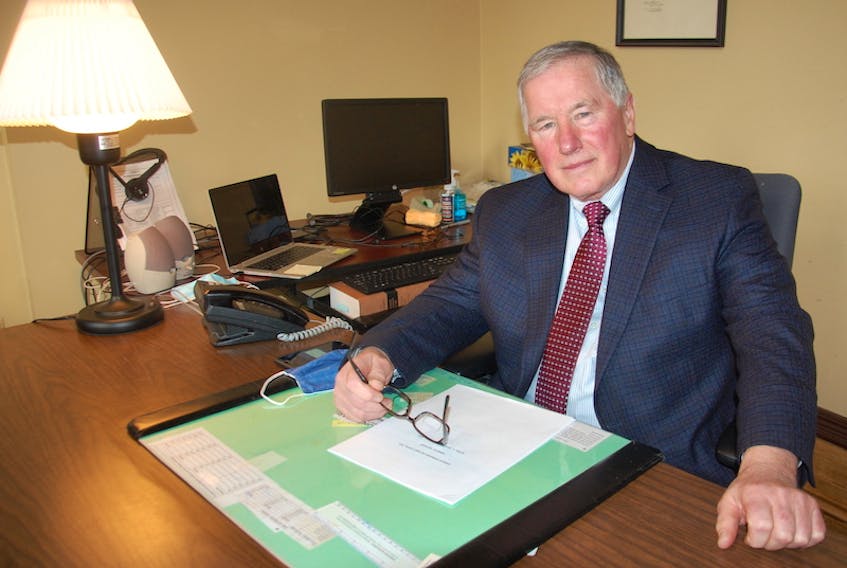CHARLOTTETOWN, P.E.I. —
There has never been any hurry to Kent Brown – not in how he carried out his duties as P.E.I.’s director of legal aid or in his decision to retire after nearly half a century of playing a key role in the province’s justice system.
“He is thoughtful in a good way,’’ Thane MacEachern, a legal aid lawyer for the past 23 years, says of Brown.
“If I had a quick question for him, I wouldn’t get a quick answer. If I had a serious question, I would get a thoughtful answer.’’
Brown’s deliberate nature was a hallmark of his impressive legal career that came to a well-deserved close in December.
Trish Cheverie, who is stepping into Brown’s shoes, describes the 72-year-old Stratford resident as a diligent thinker.
“His meticulous approach to law has led to decisions that have guided our courts for 25 years,’’ says Cheverie.
Taking over
- Trish Cheverie of Clinton is excited to be getting the nod to replace Kent Brown as director of legal aid with the province. Brown is retiring after 47 years working in legal aid.
- Cheverie decided to study law after first working as a court reporter for the Journal Pioneer in Summerside.
- She has been a legal aid lawyer for more than 25 years.
- Working in this demanding field, she says, is a daunting experience: “What we are attempting to do is make sure justice is done. We are thinking of getting a just result.’’
Brown, who grew up in Wood Islands as the youngest of four boys to Angus and Elizabeth Brown, says law caught his fancy while he was an undergrad at UPEI. He went on to graduate from law school at Dalhousie University in Halifax.
He started his career on P.E.I. as legal aid was just coming into existence in the country. The federal government, in 1973, offered incentive funding to provinces to develop criminal law programs to ensure a minimum level of service and access to legal services in all areas of Canada.

Brown notes the program offered up to 90 per cent funding in the initial years. P.E.I. bought into that and decided to go with a public defenders’ system.
Brown bought into defending people and would go on to nurture a system that sees the large bulk of legal aid cases handled by lawyers employed by the province, with other cases falling to private sector lawyers where need be.
Brown notes the role of his job has remained relatively consistent over the years but with the title changing from time to time. He went from being called senior counsel to manager of legal aid to director of legal aid.
His goal has always been to provide people with the assistance they would get in the private sector if they had the money to go that route.
“As a legal aid lawyer, it’s easy for clients to say, ‘you’re no good’ or ‘you’re not a real lawyer,’ ’’ he says.
“Actually, that was an incentive to always make sure that wasn’t a valid criticism. We always tried to do our best whether the client appreciated it or didn’t. We had to look in the mirror and tell ourselves we were doing the best job we could.’’
MacEachern says Brown never lost his genuine compassion for people in need of legal aid.
“He has all the time in the world to deal with them in a respectful way,’’ he says.
“He is what legal aid should be about. He cares about the people. He cares about the process.’’
Personal snapshot
Here is a quick look at Kent Brown:
- Lives in Stratford with his wife, Dr. Linda MacDonald Brown, a retired family physician.
- The Browns’ children are Jordie, a lawyer in P.E.I., Spencer, an emergency room physician at the QEH in Charlottetown, and Dr. Cassie Brown, a veterinarian in Ontario.
- Looking forward to retirement providing more time for gardening, sailing, skiing, church work and family activities.
- Likes to get a good feed of news online by subscribing to the Washington Post, New York Times, Globe and Mail and The Guardian.
Brown says while legal aid has enjoyed positive improvements over the years, the sad reality is that the majority of Canadians are not eligible for the free help. Income cut-offs, he explains, remain very low.
“For the simplest case, the eligibility level is probably slightly below the minimum wage level for a single person,’’ he says.
Brown adds while all legal aid cases offer different challenges, perhaps the most difficult ones are sexual abuse cases where the defender is usually very afraid of the stigma associated with the charge or charges.
“They recognize the evidence that is there against them, but they are very hesitant about admitting it,’’ he says.
Brown says child-protection cases are becoming increasingly difficult in providing service. The more dysfunctional a parent is, the greater the difficulty in dealing with the legal aspects of the case, such as mothers losing custody due to addictions.
Despite the challenges and the heavy nature of the job, Brown has never been sprinting for the finish line.
He says he kept working into his 70s because the job appealed to him more than the thought of retirement. He also credits the “wonderful staff’’ that he has worked with over the years with making it a pleasure to come to work each day.
“I’ve always enjoyed pretty well all aspects of it, especially enjoyed the variety of it and felt I was providing a public service and promoting access to government,’’ he says.
– Jim Day recently retired as a reporter with The Guardian.









